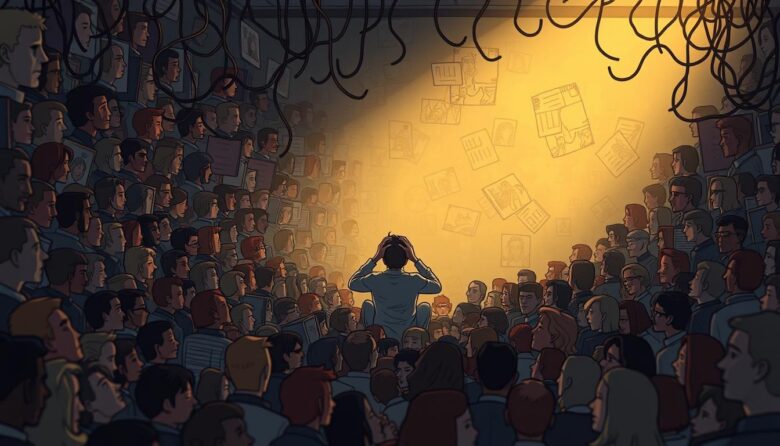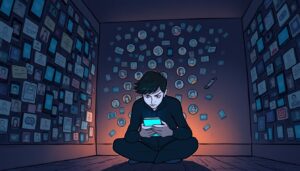Modern romance faces a paradox. While dating apps promise endless possibilities, new research shows excessive options often hinder connection. A 2024 Behavioral Science study of 804 adults reveals 62% experienced decision paralysis when presented with numerous romantic prospects.
The “plenty fish” mentality clashes with human psychology. Swipe-based platforms now dominate American dating culture, with users evaluating hundreds of profiles monthly. This constant comparison creates mental fatigue similar to marathon shopping sessions.
Post-pandemic adoption of digital matchmaking intensified this trend. People aged 18-60 report feeling overwhelmed by perpetual browsing cycles. “More options increase short-term excitement but decrease long-term satisfaction,” explains lead researcher Dr. Elena Torres.
Projections suggest 45% of women aged 25-44 will remain single by 2030. This statistic underscores the real-world consequences of endless romantic inventories. Strategic selection methods now prove crucial for those seeking meaningful relationships.
Understanding Choice Overload in Dating
Psychological studies reveal a surprising downside to abundant romantic possibilities. The phenomenon traces back to a landmark consumer behavior study where shoppers faced 24 jam varieties. While more stopped to look, only 3% bought any – compared to 30% who encountered just six options. This pattern now echoes through modern matchmaking.
When Options Become Obstacles
Neuroscientists find our brains process romantic evaluations differently than routine purchases. Assessing partners requires analyzing emotional compatibility, shared goals, and physical chemistry simultaneously. This multi-layered decision-making quickly exhausts mental resources.
The Paralysis Point
Dating platforms amplify this strain by presenting endless profiles. Users often develop “swipe fatigue,” abandoning the process altogether. A 2023 behavioral analysis found 58% of app users feel less satisfied after extensive browsing sessions than when they began.
This overload triggers survival instincts – some daters fixate on trivial flaws to narrow options, while others avoid committing entirely. Relationship experts note increased reports of dating-related stress, particularly among those aged 25-34 navigating crowded digital spaces.
The Role of Online Dating in Amplifying Choices
Digital matchmaking has reshaped how people connect, offering instant access to thousands of romantic prospects. Users now scroll through more profiles during a lunch break than their grandparents encountered in decades. This shift creates a unique tension between abundance and quality.
Digital Platforms and the Swipe Culture
Swipe-based apps train users to judge potential partners in milliseconds. A 2023 study found 72% of decisions hinge solely on profile pictures. This rapid filtering way of evaluating people often overlooks shared values or personality traits.
Platforms use game-like features to keep users engaged. Match notifications and daily “top picks” trigger dopamine responses similar to slot machines. Many report feeling trapped in endless browsing cycles, chasing the thrill of new matches rather than building connections.
Algorithmic Matching Versus Human Guidance
While dating apps rely on algorithms, these systems struggle with nuance. They track surface preferences like height or hobbies but miss subtle compatibility cues. Research shows 68% of successful couples share traits their profiles didn’t explicitly mention.
Professional matchmakers counter this by analyzing communication styles and emotional needs. Their curated approach helps users bypass decision fatigue. As one client noted, “Five thoughtful matches beat fifty random swipes for finding real potential.”
The convenience of digital dating comes with hidden costs. Users juggle more options than ever, yet satisfaction rates keep declining. Balancing technology with intentional selection strategies becomes key to navigating modern romance.
Impact on Relationship Satisfaction and Stability
Romantic abundance creates unexpected consequences for existing relationships. A 2024 study reveals 68% of partnered adults who track alternative partners report doubting their current commitment. This “phantom option” effect proves strongest among men, with 73% expressing regret about their partner compared to 41% of women.
Regret, Indecision, and Gender Differences
Evolutionary psychology helps explain why men show stronger reactions to perceived mate availability. Research suggests historical mating strategies influence modern decision-making patterns. Men with multiple alternatives become less likely to invest emotionally in current relationships.
Digital platforms exacerbate this issue by making exes and new prospects constantly visible. Partners who met through apps report 22% lower marital satisfaction than offline couples. The ease of comparing profiles fuels a “trade-up mentality” that undermines stability.
Women display different coping mechanisms. Many focus on nurturing existing bonds rather than seeking alternatives. This gender gap in response to romantic options highlights the complex interplay between biology and modern relationship dynamics.
Long-term commitments suffer when either partner maintains active awareness of alternatives. Couples who limit exposure to dating platforms report 35% higher satisfaction rates. Conscious focus on a current mate‘s unique qualities appears crucial for lasting connections.
Strategies to Navigate an Overwhelming Dating Scene
Navigating today’s romantic landscape requires strategic approaches to avoid decision fatigue. Anthropologist Helen Fisher suggests capping matches at nine profiles – a number that balances variety with mental clarity. This method helps users focus energy on meaningful interactions rather than endless scrolling.
Practical Dating Tips and Mindful Decision-Making
Relationship experts recommend creating a “non-negotiable” list of three core values. This framework helps filter matches efficiently. Many find success by dedicating specific time slots for app use, preventing endless browsing from consuming their day.
Therapists emphasize the value of support systems when making romantic decisions. Discussing options with trusted friends or professionals often reveals blind spots. Studies show people who set six-month relationship goals commit 40% faster than those without plans.
Leveraging Matchmaking Services for Better Matches
Professional services now offer curated solutions to digital exhaustion. Unlike apps showing thousands of faces, these services deliver 3-5 vetted matches monthly. Members report higher satisfaction rates due to personalized compatibility assessments.
These services combine psychological insights with human intuition. A top matchmaker notes: “We help find partners who align with clients’ lifestyles, not just photo preferences.” This tailored way of connecting saves time and reduces stress typically associated with modern romance.
Generation Z’s Challenge with Endless Options
Generation Z navigates romantic connections in uncharted territory. Born into a world of endless digital possibilities, this cohort faces unique pressures when forming relationships. With dating apps offering infinite profiles, many struggle to move beyond superficial interactions.
Behavioral Trends in Modern Connections
Young adults now encounter potential mates primarily through screens. Over 90% of Gen Z singles use apps regularly, yet only 2.5% achieve lasting bonds. This disconnect stems from habitual swiping patterns that prioritize quantity over quality.
Overchoice and Psychological Strain
Constant access to alternatives takes a toll on mental health. Studies link excessive options to heightened anxiety and indecision. Nearly 60% report feeling overwhelmed when evaluating potential partners digitally.
Commitment in the Age of Abundance
Fear of missing out drives many to avoid labeling relationships. Terms like “situationships” reflect this reluctance to commit. Experts suggest setting clear boundaries with online dating platforms to preserve emotional energy.
Balancing technology with real-world interaction emerges as crucial for Gen Z’s romantic happiness. Prioritizing depth over breadth helps counterbalance the stress of infinite choices.



